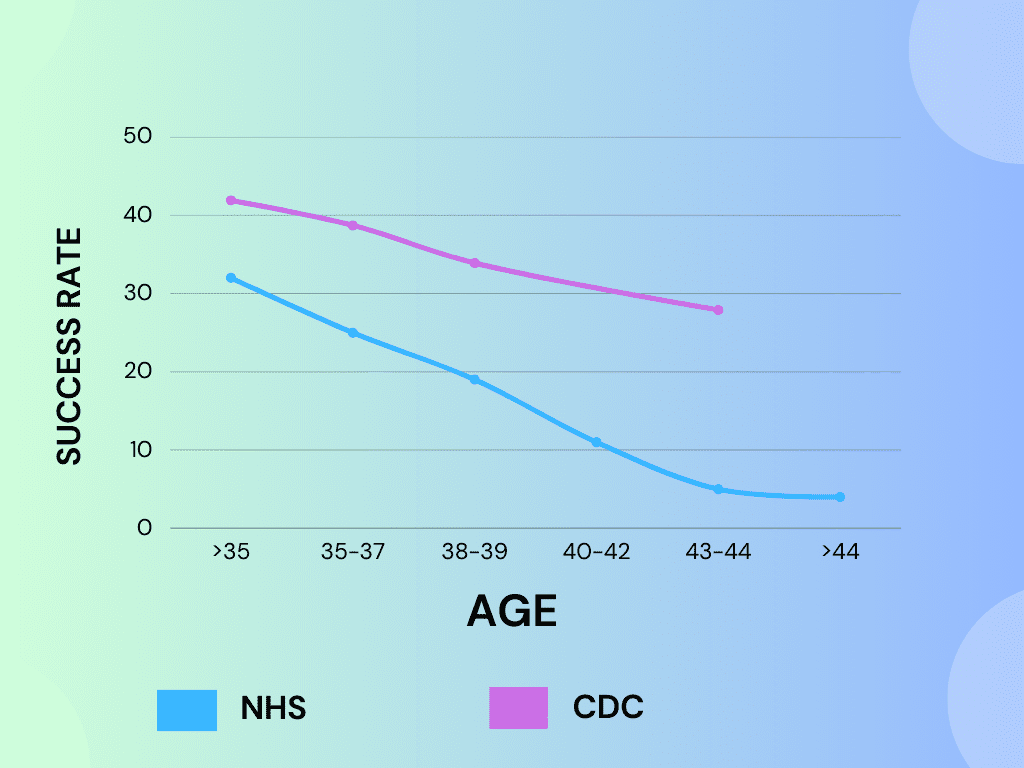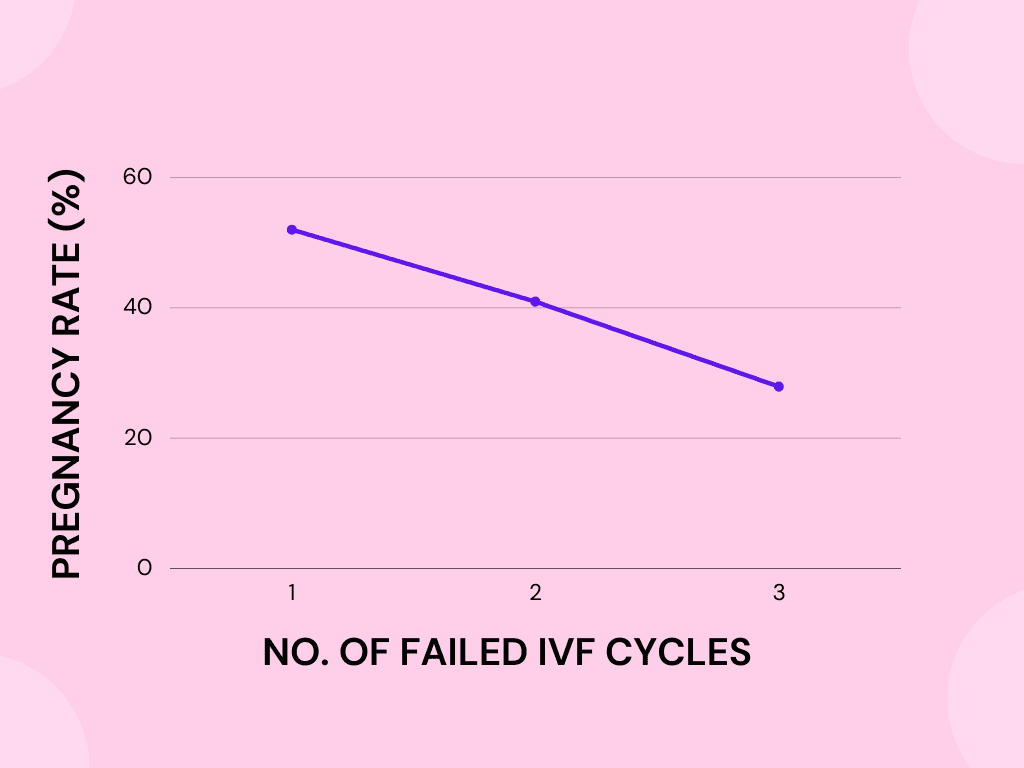Are you among the millions carrying the silent hope of parenthood? You’re not alone in this journey. Instead, 48 million couples and 186 million individuals worldwide struggle with infertility.
Understandably, hopeful parents go through over 2.5 million IVF cycles every year. In Singapore alone, people went through 7100 cycles in 2015. This number rose to 8700 in 2019.
Yet, the dance of science and nature is intricate. The success of IVF depends on many factors. If you’re on the brink of this life-changing journey, let’s navigate it together. Read on to learn:
What Does a High IVF Success Rate Mean?
According to the CDC, IVF success rate refers to the number of healthy babies born with it. In other words, healthy births are a measure of IVF success.
What are the Average IVF Success Rates by Age?
Age is the most important determinant of IVF success. Here’s how IVF success rates vary with age:
| Age group (in years) | IVF success rate according to the NHS | IVF success rate according to the CDC |
| <35 | 32% | 41.9% |
| 35-37 | 25% | 38.7% |
| 38-39 | 19% | 33.9% |
| 40-42 | 11% | 27.9% for individuals aged 40 and over. |
| 43-44 | 5% | |
| >44 | 4% |
Understanding Age as a Critical Factor in IVF Success Rates
As you get older, the chances of IVF success decrease. This is because as women age:
- The number of eggs decreases. In other words, the ovarian reserve diminishes. For example, only 4% of women aged 20 to 24 have a reduced ovarian reserve. This number jumps to 95% for women between 45 to 49 years old.
- The egg quality changes. It becomes harder for sperm to fertilize because the outer layer gets tougher. Also, the cells around the egg and the fluid that supports it lessen.
- The eggs can have more chromosomal abnormalities. This raises the risk of miscarriage or issues for the baby.
Men’s fertility also declines with age. For example, older men might see a drop in:
- Testosterone levels,
- Semen quantity, and
- Sperm quality.
Thus, IVF success rates also decrease with men’s age. Men under 35 have a success rate of about 30.6%. This number drops to 21.7% for those aged between 35 and 39. It falls further to 19.6% for men aged 40 and above.
What are IVF Success Rates for Women with Low Ovarian Reserve?
Your body starts with many eggs. But as you grow older, the quantity decreases. This leads to a low ovarian reserve (LOR).
In one study, women with LOR and aged 38 years or over had an IVF success rate of 11%. For women under 38, this number was about 17%.
What are IVF Success Rates for Women with Many Failed IVF Cycles?
The more unsuccessful IVF tries you have, the less likely it is to work. For example, in one study, 52% of women got pregnant with their first IVF cycle. This number dropped to 41% on the second try. It further decreased to 28% on the third attempt.
What are IVF Success Rates for Couples with Male Factor Infertility?
Research shows that in couples with male infertility, IVF led to a pregnancy in 52% of cases.
What are IVF Success Rates for Couples with Unexplained Infertility?
Unexplained infertility is when doctors can’t figure out why a couple can’t have a baby. In a study, about 24 out of 100 couples with unexplained infertility got pregnant using IVF.
What Influences the Success Rates of IVF Treatments?
Besides age, many factors influence IVF success rates. These include:
- Your diet and smoking habits. Studies show that having a lower body weight boosts success rates. As does avoiding smoking.
- Your alcohol intake. Drinking reduces your egg count by 13%. Thus, this lowers the IVF success rate.
- Conditions like Polycystic Ovarian Syndrome (PCOS). Women with PCOS have a 16.7% chance of having a baby with IVF.
- Clinic quality. Cleaner labs improve success rates by 10%. Likewise, advanced genetic testing can boost success rates by 50%.
- Your stress levels. Stress lowers IVF success rates.
What Can You Do To Improve Your Chances of IVF Success?
Here’s how you can improve IVF success chances:
- Lose weight if your BMI is over 30. A study showed a 57.2% pregnancy rate with IVF after weight loss.
- Stop smoking and drink less alcohol.
- Find ways to relax and manage stress.
- Adopt an active lifestyle. Active women have better chances of pregnancy and giving birth.
- Choose a good clinic for your IVF.
How Do Clinic Success Rates Vary in IVF Treatments?
Not all IVF clinics are the same. As a result, IVF success rates can vary. In general, clinics with the highest success rates:
- Use the latest technology and techniques.
- Have teams of fertility experts.
- Prioritize taking good care of you.
- Tailor treatment plans to your specific circumstances.
Choosing an IVF Clinic with High Success Rates: What To Look Out For?
The first step in picking an ideal IVF clinic is to check if it’s certified by organizations like CAP, ASRM, or JACHO. You can also speak to independent fertility experts. They can give you advice on which clinic is best for you.
Also, don’t just pick the clinic with the highest success rate. Instead, always ask them for details. For example, inquire about their success for different age groups. This will help you pick the best clinic for your situation.
Takeaway
Understanding the nuanced landscape of fertility treatments is vital. Consider how factors like age and lifestyle can influence your path to parenthood.
When you’re ready to proceed, pick a clinic wisely. Choosing one not only has a high success rate but also meets your personal needs. Let your instincts guide you. Begin with consultations and ask the hard questions. Remember, this choice is about much more than statistics. Instead, it’s about finding a place where your dream of family feels at home.
Ready to take the first step? Reach out today and schedule a consultation.
Anna Haotanto is the Founder of Zora Health and a passionate advocate for women’s empowerment. Anna’s personal experiences with egg-freezing, PCOS and the challenges of fertility have fueled her mission to provide high-quality information, financing, and support to help women and couples navigate their fertility journeys with confidence. She is also recognised for her achievements in finance, entrepreneurship, and women’s empowerment, and has been featured in various media outlets. You can also follow her on Linkedin or Instagram.







